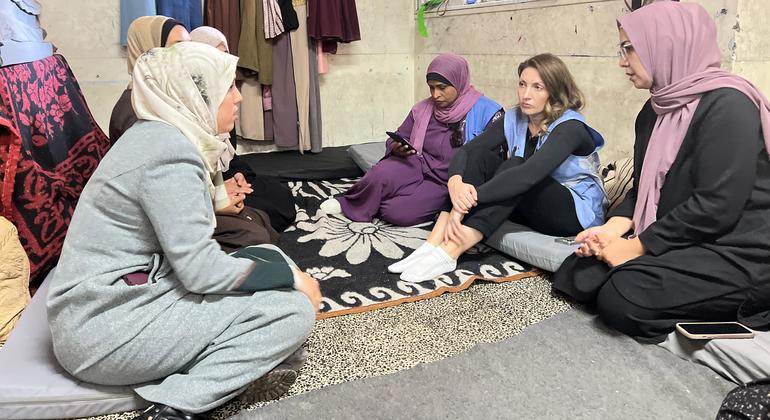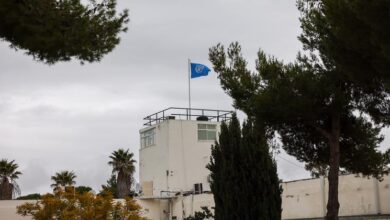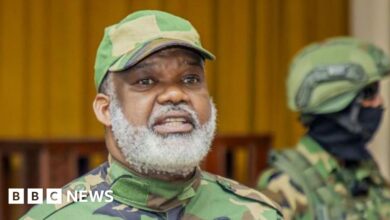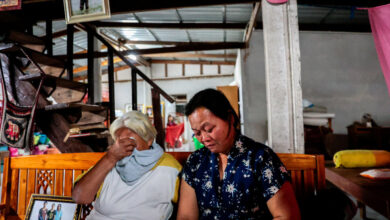UN News Champion: ‘Do You Keep Up With Death?’ The heavy toll of the war in Gaza

“My team – my friends – are the reason I am where I am today.
This will inevitably grow into a reverence for them, as well as for the Gaza I was so fortunate to know. Those who have known Gaza will understand exactly what I mean. Gaza existed before… before the unimaginable devastation that has now eclipsed its memory.
The first months of this brutal war were filled with the emotional voices of friends saying goodbye, thinking they wouldn’t make it through the night. These desperate exchanges were followed by painful silence. Mona’s words still haunt me: “If we don’t see each other again, remember me. Remember my son.” People fight to survive, disconnected not only from each other and their families but also from the outside world – who are scouring the news and social media for any updates.
Mohammed’s daughter Sama was born on October 31, 2023 in Gaza City. The ambulance was overloaded, responding to casualties from bombs and bullets. He had to dodge the attack to take his wife to the hospital. She gave birth in the midst of death. A few weeks later, My colleague’s four-year-old daughter, Salma, was shot in the neck by Israeli forces while the family was trying to flee Gaza City. She died in his arms on the street. The pain was forever etched on his face.

UNRWA officer Louise Wateridge, speaking to families displaced from northern Gaza (November 2024)
‘They were shooting at us in the yard’
Earlier this year, we lost contact with Hussein for a week, when the United Nations facility his family was sheltering in was surrounded by tanks, trapping more than 40,000 people inside. The last text we received from him: “They are shooting at us in the courtyard.” Ambulances and emergency crews were denied access. When we finally contacted him, he was burying the bodies of those killed, including children, in the yard.
Some of the most powerful footage of this war was shot by my colleague Abdallah. In February, Abdallah was attacked while filming in northern Gaza. On Saturday afternoon, we were informed that he had been killed. I vividly remember the air leaving my lungs and not being able to fill them again. On Monday, someone found Abdallah in the hospital – alive, with both legs amputated. Soon after, we lost contact with him for fourteen long days, while doctors tried to keep him alive in Al-Shifa, with the entire hospital under Israeli siege. Miraculously, after four tries, the UN finally reached him
And then April. I was finally allowed into Gaza, for the first time since the war began. The first place I visited was the field hospital in Rafah, where Abdallah barely survived. It’s a tent on the sand. Doctors informed us that he only had a few days to live because they did not have the necessary equipment or drugs to treat him further. Two colleagues with the same blood type as mine donated blood on the spot just to help him survive. Two long months after being hit, Abdallah was granted medical evacuation, just days before the Rafah border crossing was permanently closed. To this day, it’s hard to believe he survived.
In May, everything collapsed before our eyes. The joy we shared at being reunited and the relief that Abdallah was safe were short-lived as military attacks on Rafah began. It was chaos, panic and terror. I was stunned to witness with my own eyes more than a million people forced to relocate from a restricted area in just a few days. One of the first people I knew to flee Rafah was Jamal. He followed instructions from mandatory evacuation papers dropped from the sky and moved his family to Deir al Balah. That same night, he was killed by an Israeli attack while sleeping with his family.

UNRWA staff member Louise Wateridge participates in psychosocial activities with children at a school in Gaza City (November 2024)
Is the world still searching?
One of the last people I knew to flee Rafah was Mohammad. He carried an unspoken fear and denial of what was happening around us. The echo of “but where do we go” filled every nervous look and conversation. Mohammad stayed until that thing night – the night a headless child was pulled from a burning tent after an Israeli attack – is infamous for its images that went viral across the globe. They say all eyes are on Rafah. On the outside it seems like no one knows or understands that this happens every night… but the images don’t always save people from their nightmares when they appear in the world’s media. The screams of helpless children being burned alive around Mohammad still echoed in his head every night.
If you have read this far then you will know why I am in Gaza. You will understand why my life is on hold, I will do what I can to spend time with my friends and report on the horrors that continue to engulf their lives. Reports of families screaming at us in desperation, desperate for information about loved ones who have been detained for months. Reports of bodies we saw of people around checkpoints, eaten by dogs. Reports of toddlers in hospital with limbs amputated after strikes in “humanitarian areas”. Mona’s brother, killed. Hussein’s daughter, killed. Rajaa’s cousin, was killed. Are you keeping up with death? Because we don’t. Here, you are considered lucky if you actually know whether your family is alive or not.
Journalists on the ground – risking life and limb every day to show the world the horror that is ravaging their friends, their families, their neighbors. Is the world still searching? Isn’t everyone on the outside tired of hearing about children being killed in every possible way: dead from strikes, dead from being buried under rubble, dead from malnutrition, dead from hospital beatings? bomb, died because the incubator had no electricity, died because of simply existing. The whole society is now a cemetery, but no one has a chance to mourn, because they have to survive. Food, water, healthcare, safety – how can we end another year and still have such basic needs continue to be in short supply? 100 hostages are still in Gaza, their families desperately waiting for their return and news of their safety. More than two million people are trapped. They cannot escape. There is no way out.
As for me, I will never forget singing happy birthday to baby Sama, who is now one year old – everyone united in determination was greater than the bombs falling around, shaking the ground we were standing on. Her entire life, consumed and defined by the brutality of war.”




